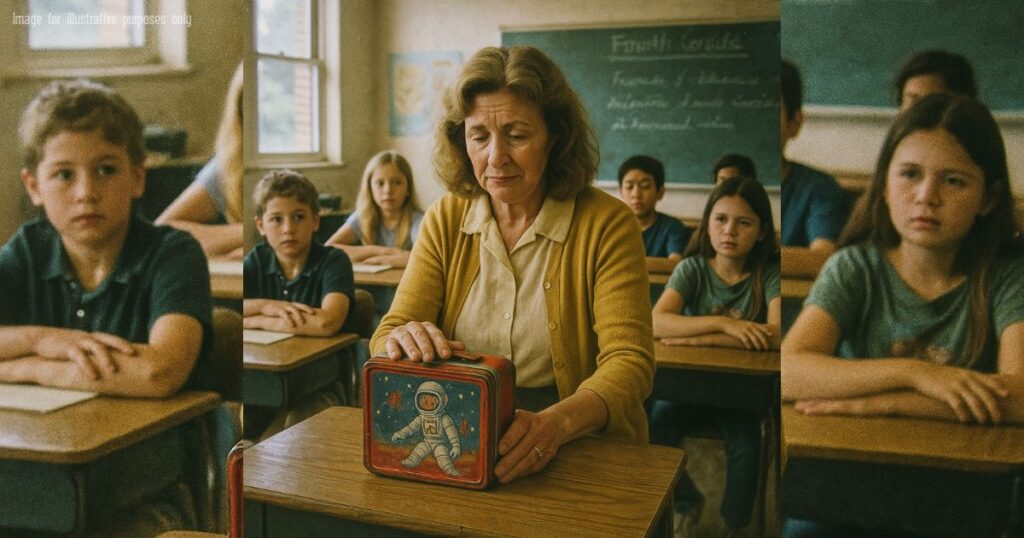I asked my ten-year-old students to write down their biggest worry. I was expecting “homework” or “monsters.” The answers I got broke my heart.
For thirty-nine years, I’ve been Ms. Albright. Room 2B. Fourth Grade. I’m one year from retirement, and my classroom is a time capsule. The posters are laminated originals from 1992. I still believe in cursive.
And I still believe in the “good old days.”
I look at my students, with their little faces already glued to their parents’ phones at pickup, and I mourn for them. I grew up in the seventies. My biggest trauma was a scraped knee. Theirs seems to be… everything. They seem so heavy.
One Tuesday, I brought in it. My 1973 original. A faded red metal lunchbox with a cartoon astronaut on the front.
“Class,” I announced, setting it on my desk with a proud thud. “This was my lunchbox. Back then, our biggest worry was what sandwich our mom packed.”
They stared, silent.
“You all seem so serious lately,” I continued, forcing a bright smile. “Let’s play a game. We’ll call it ‘Then & Now.’ I’m going to write down my biggest worry from when I was ten.”
I took an index card, wrote on it, and held it up. “My biggest worry? Being picked last for kickball.”
A few kids giggled. The levity felt good.
“Now, it’s your turn.” I passed out the cards. “Anonymous. Total honesty. Write down your biggest worry. The one that sits in your chest. Then, fold it and put it in the astronaut box.”
The giggling stopped.
For five minutes, the only sound was the scratching of pencils. I saw little Mark, who never stops talking, just staring at the ceiling, his pencil frozen. I saw Emily, whose clothes are always perfect, wipe her eye before she started writing.
One by one, they came up and dropped their folded cards into the box. The clink of the paper hitting the tin sounded too loud in the silence.
“Alright!” I said, rubbing my hands together. “Let’s see what’s changed!”
I reached in and pulled out my card first. “Being picked last for kickball! A classic!”
I laughed. No one else did.
I reached in again and unfolded the first card. My smile froze.
“I’m scared when the doorbell rings after dark. Mom turns off all the lights and tells us to hide under the blankets. I think it’s the man from the bank.”
My breath hitched. I pulled another.
“Mommy cries in the shower so no one can hear. I heard her tell Grandma the ‘medicine’ isn’t working and she’s ‘so tired’.”
I pulled another.
“My big brother says if I tell Dad what he does in his room, he’ll post the ‘ugly video’ of me crying on the internet. I don’t know what video he means.”
Another.
“I’m trying not to eat so I can look like the girls on Mom’s phone. But I’m always hungry.”
Another.
“I check Dad’s closet every morning. He told us he was going to ‘get clear’ and would be back. His shoes are still gone.”
I kept reading. For ten minutes. The room was tomb-silent.
I read about parents who were “asleep” and wouldn’t wake up. I read about hearing yelling through the apartment walls. I read about being afraid of the news. I read about a little boy who just wrote, “I wait for the bus by myself. No one ever waves goodbye from the window.”
When I finished the last card, I couldn’t speak. I looked up.
The “good old days” were a lie. Or worse, they were a privilege.
These weren’t children. They were tiny, terrified survivors, dressed in superhero t-shirts.
I watched as Emily, the “perfect” girl, quietly reached across the aisle and slid her hand into Mark’s, the “loud” boy. He gripped it.
My hand found my own card on the desk. “Being picked last for kickball.”
I looked at that stupid, trivial, beautiful fear. A fear that came from a world that was safe enough to let you worry about something so small.
Slowly, I crumpled the card in my fist. I didn’t throw it away. I opened the astronaut box, dropped my balled-up worry inside, and closed the lid. It belonged with theirs.
“The good old days…” I said, my voice cracking. “They weren’t better. They were just… easier. We just… we got to be children for longer.”
The bell rang. No one moved.
That metal lunchbox doesn’t sit on my shelf as a memory anymore. It sits on my desk as a reminder. We are a nation obsessed with pretending everything is fine. We post the vacation photo, not the argument that happened right before it. We show the perfect house, not the foreclosure notice on the door.
And our children are watching. They’re not “too complex.” They’re just living in the world we built for them.
We need to stop telling our kids to “be strong” and start asking them, “Is it heavy today?”
You don’t have to fix their problems. You just have to prove to them that they aren’t carrying the weight alone.
Click the button below to read the next part of the story.⏬⏬


